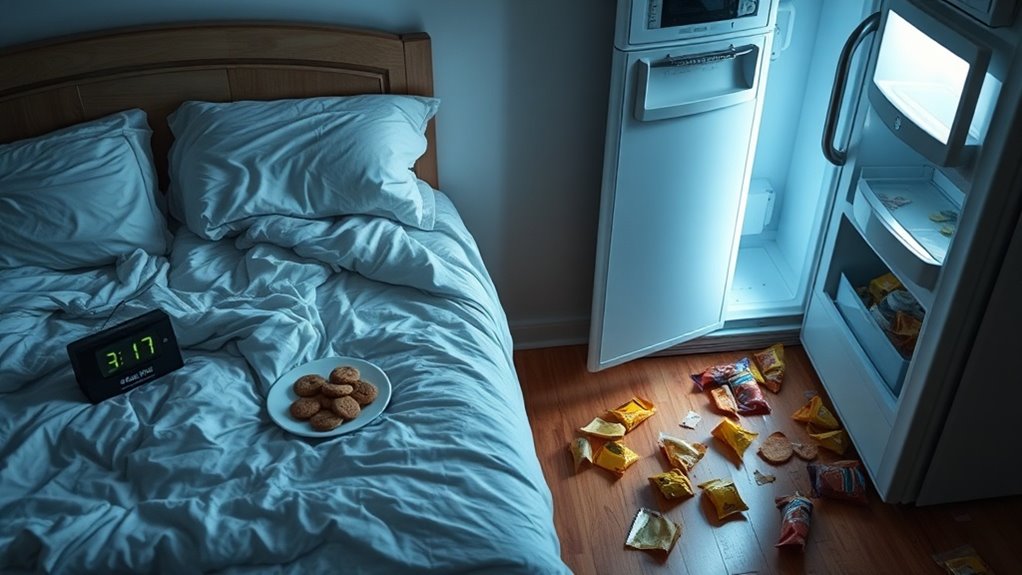What No One Told Me About Sleep and Belly Fat
Like a hidden villain in a classic tale, sleep deprivation quietly sabotages your efforts to shed belly fat. You might not realize it, but lack of quality sleep directly impacts hormones that regulate hunger and fat storage. This connection can lead to cravings and weight gain, even if you’re eating well and exercising. Understanding this relationship could be the key to unlocking a slimmer waistline and a healthier you. What if the solution lies in your nightly routine?
Key Takeaways
- Inadequate sleep elevates cortisol levels, promoting fat storage, especially around the belly.
- Sleep deprivation disrupts appetite-regulating hormones like ghrelin and leptin, increasing cravings and hunger.
- Poor sleep quality leads to insulin resistance, hindering fat metabolism and contributing to weight gain.
- Stress and high cortisol can disrupt sleep cycles, reducing overall rest and making weight management harder.
- Implementing good sleep hygiene and a consistent schedule can help regulate hormones and reduce belly fat.
The Science Behind Sleep and Weight Gain
Sleep isn’t just a time for rest; it plays a crucial role in regulating your weight.
Research shows that inadequate sleep can disrupt your body’s ability to manage fat storage.
When you skimp on sleep, your body may increase levels of cortisol, a hormone linked to fat accumulation, particularly around your belly.
Additionally, poor sleep affects your appetite-regulating hormones, leading to cravings for high-calorie foods.
This combination can create a vicious cycle of weight gain.
Prioritizing quality sleep can help you maintain a healthier weight by supporting your body’s natural processes for managing fat storage. Moreover, sufficient sleep helps regulate hunger hormones effectively, which can reduce cravings and support weight loss efforts.
How Sleep Deprivation Affects Hormones
How does a lack of sleep impact your hormonal balance? Sleep deprivation disrupts key hormones like cortisol, ghrelin, and leptin. Elevated cortisol can lead to increased appetite and fat storage, while ghrelin spikes hunger, and leptin drops satiety signals. Consequently, this imbalance often results in weight gain, particularly around your belly. Additionally, elevated cortisol levels can promote fat storage, especially around the midsection.
| Hormone | Effect of Sleep Deprivation | Resulting Impact |
|---|---|---|
| Cortisol | Increased | Higher appetite, fat storage |
| Ghrelin | Increased | Increased hunger |
| Leptin | Decreased | Reduced satiety |
The Connection Between Stress and Sleep Quality
Stress plays a significant role in determining the quality of your sleep.
When you’re stressed, your body produces cortisol, a hormone that disrupts your sleep cycle.
High cortisol levels can lead to difficulty falling asleep and staying asleep, leaving you feeling exhausted.
Research shows that chronic stress not only reduces your sleep duration but also affects sleep stages, impacting restorative deep sleep.
As a result, you might wake up feeling unrefreshed, which can further exacerbate stress.
Managing stress through techniques like mindfulness, deep breathing, or exercise can significantly enhance your sleep quality, promoting better overall health and well-being. Additionally, adopting a sustainable lifestyle approach can help mitigate stress, making it easier to achieve better sleep and overall health.
The Role of Sleep in Metabolism
While you might focus on diet and exercise to manage your weight, the quality of your sleep plays a crucial role in your metabolism.
When you don’t get enough rest, your body struggles to regulate hormones like ghrelin and leptin, which control hunger and fullness. This imbalance can lead to increased cravings and overeating.
Furthermore, poor sleep affects insulin sensitivity, making it harder for your body to process sugars, resulting in potential weight gain. Prioritizing restful sleep can enhance your metabolic function, helping you achieve your weight management goals more effectively. During sleep, your body can also utilize fat more efficiently, particularly through the activation of brown fat, which supports metabolism. So, don’t underestimate the power of a good night’s sleep!
Tips for Improving Sleep Hygiene
Improving your sleep hygiene can dramatically enhance the quality of your rest and, in turn, support your weight management efforts. Here are some practical tips to get you started:
| Tip | Description |
|---|---|
| Maintain a schedule | Go to bed and wake up at the same time daily. |
| Create a restful space | Keep your bedroom dark, cool, and quiet. |
| Limit screens | Avoid screens at least an hour before bedtime. |
| Watch your diet | Avoid large meals and caffeine close to bedtime. |
Implementing these strategies can lead to deeper sleep, helping you tackle those stubborn belly fat challenges. Additionally, prioritizing quality sleep is crucial for maintaining a healthy metabolism and managing cravings effectively.
The Impact of Sleep on Food Cravings
When you skimp on sleep, your body can throw your hunger hormones out of balance.
Research shows that sleep deprivation increases levels of ghrelin, the hormone that boosts appetite, while decreasing leptin, which signals fullness.
As a result, you might find yourself craving unhealthy foods more often, making it harder to manage your belly fat. Additionally, sleep deprivation can disrupt hunger hormone regulation, further exacerbating these cravings.
Sleep Deprivation Effects
Sleep deprivation significantly impacts your food cravings, leading to unhealthy eating habits and weight gain.
When you’re sleep-deprived, your body craves high-calorie, sugary foods to compensate for the lack of energy.
Here are three key effects of sleep deprivation on your cravings:
-
Increased hunger hormones: Lack of sleep boosts ghrelin, which signals hunger, making you more likely to overeat.
-
Decreased satiety hormones: Sleep deprivation lowers leptin, the hormone that tells you when you’re full, leading to constant snacking.
-
Impaired food choices: Tiredness can weaken your willpower, making junk food more tempting.
Prioritize sleep for better eating habits!
Hormonal Imbalances Explained
How does a lack of restful nights throw your hormones out of balance?
When you skimp on sleep, your body increases ghrelin, the hunger hormone, while decreasing leptin, which signals fullness.
This imbalance leads to heightened cravings for high-calorie foods, making it tough to resist unhealthy snacks.
Additionally, sleep deprivation raises cortisol levels, the stress hormone, further promoting fat storage, particularly around your belly.
Research shows that consistent, quality sleep helps regulate these hormones, making it easier to maintain a healthy weight.
Prioritizing your sleep isn’t just about rest—it’s crucial for managing cravings and supporting your overall health.
Strategies for Achieving Better Sleep for Weight Management
To manage your weight effectively, prioritizing better sleep is essential.
Implementing sleep hygiene practices, reducing stress, and maintaining a consistent sleep schedule can significantly enhance your rest quality. Additionally, ensuring you get adequate sleep can help regulate hunger-controlling hormones, making it easier to manage cravings and maintain a healthy weight.
Sleep Hygiene Practices
Ever wondered why some people seem to shed belly fat effortlessly while others struggle, despite their best efforts?
The secret often lies in sleep hygiene practices.
Prioritizing quality sleep can significantly impact your weight management journey.
Here are three effective strategies to enhance your sleep hygiene:
- Consistent Sleep Schedule: Go to bed and wake up at the same time daily, even on weekends.
- Create a Sleep-Inducing Environment: Make your bedroom dark, quiet, and cool to promote restful sleep.
- Limit Screen Time: Avoid screens an hour before bed to reduce blue light exposure, which can disrupt your sleep hormone levels.
Implementing these tips can help you manage your belly fat more effectively.
Stress Reduction Techniques
While it might seem challenging to lose belly fat, managing stress can play a crucial role in improving your sleep and, in turn, your weight management efforts.
Incorporating techniques like deep breathing, meditation, or yoga can significantly lower cortisol levels, which contribute to fat accumulation. Regular physical activity also helps reduce stress while promoting better sleep quality.
Consider journaling your thoughts before bed to clear your mind. Establishing a calming bedtime routine can also signal your body to unwind.
Sleep Schedule Consistency
Managing stress is just one part of the equation when it comes to achieving better sleep and, subsequently, effective weight management.
A consistent sleep schedule can significantly impact your body’s ability to regulate appetite and metabolism.
Here are three strategies to help you establish consistency:
- Set a Fixed Sleep Time: Go to bed and wake up at the same time every day, even on weekends, to regulate your internal clock.
- Create a Pre-Sleep Ritual: Engage in calming activities like reading or meditating to signal your body it’s time to unwind.
- Limit Screen Time: Reduce exposure to screens at least an hour before bed to improve sleep quality.





